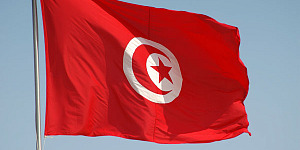Tunisia's central bank raised its key interest rate by 50 basis points to 4.75 percent at an extraordinary board meeting to help ease rising inflationary pressures following a sharp fall in the dinar's exchange rate and said it was closely following those pressures so it could "undertake the appropriate actions on time."
It was the first change in rates by the Central Bank of Tunisia (CBT) since October 2015, when the rate was lowered by 50 basis points. The bank's board met on April 25.
The central bank also raised the minimum savings rate that banks can offer by 50 points to 4.0 percent to boost the incentive to save and thus liquidity in the financial system. Tunisia's banks are in need of liquidity given a weak level of savings in the country, the central bank said.
The rate hike comes a week after Tunisia's finance minister said the central bank would reduce interventions in the foreign exchange market so the value of the dinar gradually declines in an effort to boost exports and lower imports, and thus reduce the trade deficit.
But last week's sharp fall in the dinar appears to have surprised the central bank, which said economic data "in no way justify the fluctuations recorded on the exchange market," and talks between the IMF and the government "were globally positive and encouraging."
The central bank added it did not have an exchange rate target in mind, nor was it floating the dinar but would carry out "well-calibrated interventions" to smooth our sharp fluctuations in the exchange rate while seeking to "contain the trade deficit slippage," ensure financing of imports and preserve foreign currency reserves.
The International Monetary Fund (IMF) last week released some US$319 million as part of an overall fund facility for Tunisia of some $638.5 million that is aimed at boosting economic growth and jobs at a time of high fiscal and external deficits.
The government and IMF are also working to increase social spending and strengthening the country's social safety net to "protect the vulnerable in these challenging times," the IMF said.
The IMF also said on April 17 that tighter monetary policy would help counteract inflationary pressures, give further flexibility to the exchange rate and narrow the trade deficit.
On April 18 the finance minister told local radio that the central bank would reduce its interventions in the foreign exchange market while still preventing a sharp slide in the dinar and avoiding what he described as Egypt's "brutal devaluation" of its pound last year of over 30 percent.
On April 20 and 21 the dinar fell by almost 9 percent to 2.52 to the U.S. dollar but it has rebounded this week and was trading at 2.46 today, down 6.5 percent since the start of this year.
Tunisia's inflation rate rose to 4.8 percent in March from 4.6 percent in the two previous months while Gross Domestic Product in the fourth quarter of last year rose by an annual 1.1. percent, down from 1.2 percent in the third quarter.
It its statement, the IMF said growth was expected to double this year to 2.3 percent "but will remain too low to significantly reduce unemployment, especially in the interior regions and among the youth."
The official unemployment rate was 15.5 percent in the last quarter of 2016.






















































